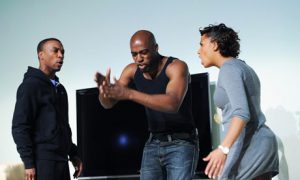Growing up on a council estate in London, or any estate in the United Kingdom for that matter, can be alright for some, but for others, the disadvantages outweigh the good. Many people have a love-hate relationship with council estates, and there are specific council estates which are deemed dangerous or not suitable for anyone to live in.
When I first came to the UK, I remember two notorious council estates many did everything they could to avoid living in. Some people went as far as feigning medical conditions, or coming up with stories as to why it would be dangerous for them to live in an estate like that.
Kingsmead and Pembury Estate were two of such estates in Hackney, East London, then. Stories included unending police sirens; you heard them first thing in the morning and last thing at night. People were sometimes not too keen to let you know that was where they lived, for the stereotypes that would immediately be associated with them.
It is the story of the different people who find themselves on sych estates, and want to get out of the system, that Bola Agbaje wanted to tell in her new play, Off the Endz. Most commonly, such stories are referred to dismissively as ‘hood stories.’ Agbaje, who grew up in a South London estate, though she no longer lives in one, says her play is not a mere ‘hood story,’ but a tale that needs to be told and paid attention to.
We are thrown into the world of David, Kojo and Sharon – old friends, who have lived their lives in the Endz, until Kojo and Sharon decide it’s time to get out. David has recently been released from jail, and going back to his old ways has not taken much time. David is a brash character with no manners; you would not hesitate to slap him if he spoke to you in a manner you do not appreciate. At the same time, you cannot help but take pleasure in his boldness and desire to also get out of the system and become rich. Is he doing it the right way, though?
David is the kind of guy who many would describe as callous, because he is ready to do what he needs to do, including sell drugs, as long as he gets what he wants. He is a chip off the old block with an attitude on his shoulders and the belief that the world owes him.

David’s fiery temper is in direct contrast to Kojo’ level-headedness and desire to do things right: getting a job with the intent of working his way up and preparing to become a family man with his girlfriend, Sharon, who is expecting a baby. Sharon, though, used to be David’s muse. Soon their inter-twined lives turn sour, with Kojo’s financial challenges taking him straight back to where he is coming from. This is a road Sharon is not prepared to travel on.
Agbaje writes with an adept understanding of the environment her play is steeped in. Her characters are deftly structured to bring out the best and worst in each other, but they also effortlessly convey the themes she cares about. Through David and Kojo, you see that life is about the choices you make and so you must be ready to face up to the consequences, good or bad. Kojo and Sharon’s relationship revolves around dreams – with the constant, ever-present reminder that dreams always have a cost.
If there is one major flaw to be found here, it is in the altogether typical stereotypes of black people, something that David uses as his excuse for always being at the bottom of the ladder. Agbaje aims to resolve this by stating its people like him who, in the end, give blacks a bad name.
In their respective roles, Ashley Walters (David), Lorraine Burroughs (Sharon) and Daniel Francis (Kojo) deliver a series of emotionally charged scenes. Off the Endz does give you a lot to think about, especially with the expectations placed on the young British society today – people who are ladened with debt, stuck in disastrous environments, and trying to swim their way out of it.
Off The Endz is on at the Royal court Theatre until 13 march 2010.
